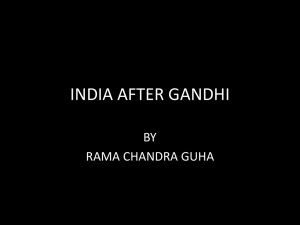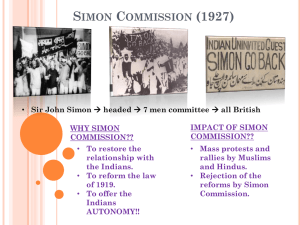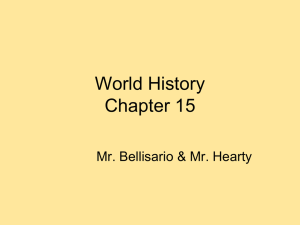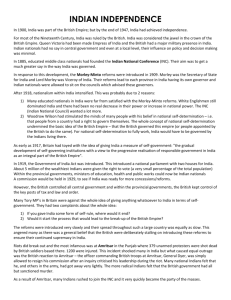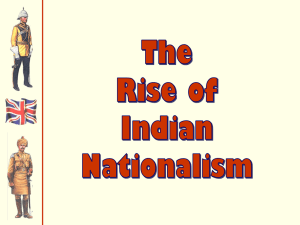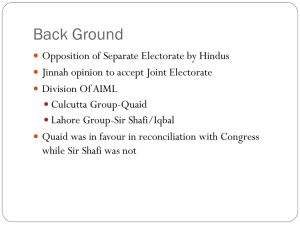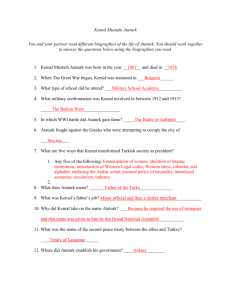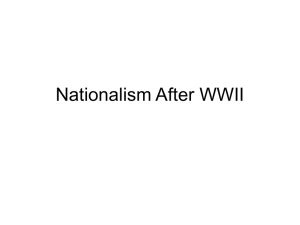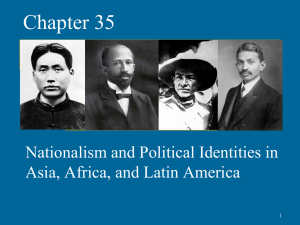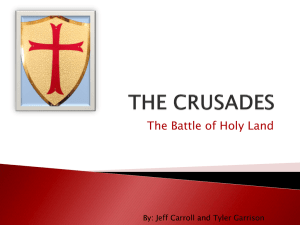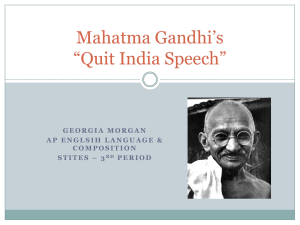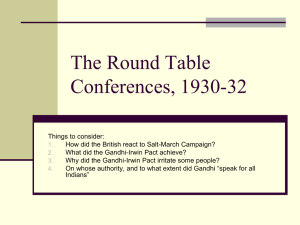Nationalism in Asia - All Hallows High School
advertisement
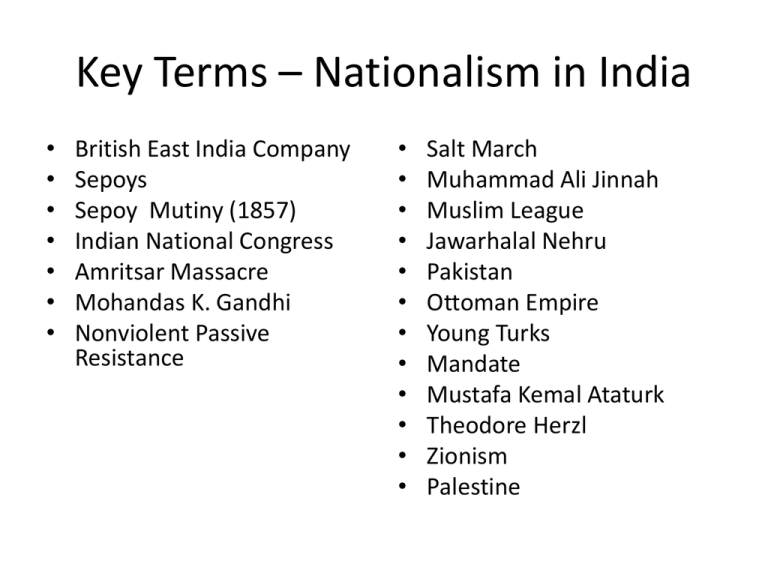
Key Terms – Nationalism in India • • • • • • • British East India Company Sepoys Sepoy Mutiny (1857) Indian National Congress Amritsar Massacre Mohandas K. Gandhi Nonviolent Passive Resistance • • • • • • • • • • • • Salt March Muhammad Ali Jinnah Muslim League Jawarhalal Nehru Pakistan Ottoman Empire Young Turks Mandate Mustafa Kemal Ataturk Theodore Herzl Zionism Palestine The British in India • Britain acquired control of India in the 1600’s and governed through the British East India Company. • British East India Company trading company given a monopolistic control over India • The East India Company was an indirect form of rule over India by the British Imperialistic in nature. Britain Improves India • Even though the people of India were under the control of the British, they actually were able to benefit from the indirect rule of the British. • They acquired: – Telegraph lines – Railroads to improve transport – Irrigation systems – Industries (factories) Other Changes in India • Though the British improved the infrastructure of India, many of these changes did not directly help the people of India, rather it was more to improve the use of India for the British • People of India were not treated as equals. • Made the central government extremely vital to the daily running and maintenance of India • Introduced schools and educated many Indians to use as workers in many fields. Sepoy Mutiny • Sepoys Indian soldiers hired by the British East India Company. • In 1857, the sepoys were asked to unpack ammunition covered in beef and pork fat (prevented accidental firing). – This action insulted the Hindus who revered cattle and Muslims who refused to touch pork or eat it. – Many sepoys would be jailed for not using the ammunition. • Thousands of sepoys rebelled against the British, and marched to Delhi in an attempt to install a new government. • Rebellion would be known as the Sepoy Mutiny. It would be put down by the British in 1858-1859. The British would take direct control of India as a result. Reactions • Nationalism in India grew as a result of the Sepoy Mutiny. • This led to calls for new governing bodies for Indians and Muslims alike. • Indian National Congress national organization set up in 1885 by middle class Hindu professionals. • Muslim League national organization set up by Muslims to acquire more rights from the British Incursions • British gave small rights to the people of India but still restrained their rights in many ways. • Indian troops fought for the British in World War I and demanded more rights upon their return. Amritsar Massacre • In 1919, crowd of 10,000 people gathered in a public garden for a festival. • The British assumed this would be another violent protest and ordered soldiers to fire at the crowd. • 400 people were killed and 1200 people were wounded this event would be known as the Amritsar Massacre. Mohandas Gandhi • The massacre increased the want for Indian self-rule. • Gandhi lawyer who became the head of the Indian National Congress and promoted nonviolent protest. • Gandhi encouraged people of India to engage in non-violent passive resistance protest actions via boycotts and marches. • He believed that through actions such as refusing to pay taxes, serve in the military or buy British goods, Indians could force the British to give up control of India. The Salt March • Gandhi would lead a massive demonstration in 1930. • He led a boycott on British salt where he asked the people of India to walk to the sea and acquire salt. • This long walk was known as the Salt March. • Many were arrested and jailed for the protest. Muhammad Ali Jinnah • Jinnah activist within the Muslim League in India and would become president in 1934. • Was an active proponent of establishing an independent Muslim state carved out of India. Jawarhalal Nehru • Nehru Hindu nationalist leader. • Fought to improve relations between Muslims and Hindus • Would also attempt to protest British rule. • Would be imprisoned numerous times as a result. Independence From Britain • Independence could have occurred at a much earlier time but infighting between Muslims and Hindus made it difficult and the advent of World War II also did not help. • Bloody riots would occur in 1947 between Hindus and Muslims over how an independent government in India would look – Pakistan would be carved out of India and become a separate Muslim state. – Nehru became the first Prime Minister of India while Jinnah led the first government of Pakistan. – Gandhi would be assassinated a year later by a Hindu extremist. The Ottoman Empire • The Ottoman Empire governed the Middle East since the 14th Century and grew weaker over time as more and more groups sought to separate. • A new constitution would be constructed in 1876 but would be ignored by the sultan. The Young Turks • Young Turks group of military officers who wanted the restoration of the constitution of 1876. • The Young Turks sought to westernize the Ottoman Empire to improve its economic and social viability on the world’s stage. • After the end of World War I, the empire would be divided into mandates areas indirectly controlled by other countries for financial reasons. Mustafa Kemal Ataturk • The Young Turks wanted to resist the division of Turkey by the major powers of World War I. • The Young Turks led by Mustafa Kemal Ataturk refused European rule and held Constantinople. – Ataturk would become the first president of the new government of Turkey. Theodore Herzl • Jewish peoples sought a place they could be safe and call their homeland. • Herzl Austrian Jew who led a movement known as Zionism movement that sought a Jewish state in Palestine. • Currently, Palestine was under the control of the Ottoman Empire. Jewish Homeland • Zionists believe that after suffering through the pogroms in Russia that they deserved a homeland where they would not be persecuted. • Britain would assist with the Balfour Declaration support from the British for a Jewish national homeland in Palestine. • Arabs grew upset that their territory had been given away by an outside power. Results • The outbreak of the Holocaust forced many Jews to move into Palestine. • After the war was over, Britain, at this point would not support the immigration of further Jews. • Palestine, in 1947, would be divided into a Jewish state and an Arab state. • Zionists declared the birth of Israel which would be attacked by neighboring Arab states. • Israel would gain the territory but fighting would continue even today.
